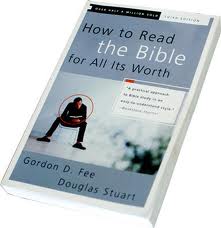
I realize that the Bible can be a difficult book to understand and one can be led into error if he has a faulty understanding and interpretation of it. Many years ago, I came across a book that really helped me read and understand the Bible better. The title of the book is, How to Read the Bible for All Its Worth by Gordon D. Fee and Douglas Stuart, 1992 edition. It gives some basic and practical suggestions on how to read the Bible. Here are some excerpts from this book.
Pride and False Understanding of Spirituality
“The aim of good interpretation is not uniqueness; one is not trying to discover what no one else has ever seen before.
“Interpretation that aims at, or thrives on, uniqueness can usually be attributed to pride (an attempt to ‘out clever’ the rest of the world), a false understanding of spirituality (wherein the Bible is full of deep truths waiting to be mined by the spiritually sensitive person with special insight), or vested interests (the need to support a theological bias, especially in dealing with texts that seem to go against that bias). Unique interpretations are usually wrong. This is not to say that the correct understanding of a text may not often seem unique to someone who hears it for the first time. But it is to say that uniqueness is not the aim of our task.”
Interpretation: Common Sense
“The aim of good interpretation is simple: to get at the ‘plain meaning of the text.’ And the most important ingredient one brings to that task is enlightened common sense. The test of good interpretation is that it makes good sense of the text.
“The first reason one needs to learn how to interpret is that, whether one likes it or not, every reader is at the same time an interpreter. That is, most of us assume as we read that we also understand what we read. We also tend to think that our understanding is the same thing as the Holy Spirit’s or human author’s intent. However, we invariably bring to the text all that we are, with all of our experiences, culture, and prior understandings of words and ideas. Sometimes what we bring to the text, unintentionally to be sure, leads us astray, or else causes us to read all kinds of foreign ideas into the text.” (pages 15-16)
These are just some quotations from this wonderful book. I learned a lot from it. You can buy it at bookstores or you can buy it online.
